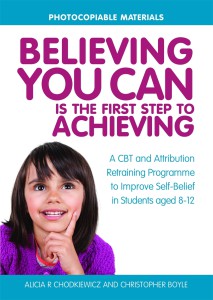Alicia Chodkiewicz, Child Development psychologist with over ten years’ experience supporting students both inside and outside of the classroom, and co-author of Believing You Can is the First Step to Achieving, shares her insight into some of the issues and solutions surrounding self belief in students. You can also try out some free sessions from the book by downloading the extract at the end of this post.
THE ISSUE
Many children can struggle with learning in their middle school years. This is a crucial time for parents and teachers to address what can become deeply entrenched negative self-beliefs about learning.
The way a child thinks shapes how they will approach their learning at school. A student who approaches their learning with positive thoughts is more likely to succeed, whereas one who has negative or unhelpful thoughts is less likely to achieve their full potential. Furthermore, a student with negative thoughts will feel that his views about himself are justified when he fails to achieve high results. This can lead to a negative self-fulfilling prophecy such as ‘why try, I won’t succeed’ used as the learning mantra. This, in turn, can result in students developing entrenched and unhelpful attitudes which can also lead to poor decision making in current learning which inevitably affects future approaches to key areas of education.
THE ANSWER
Based on an emerging academic field of cognitive psychology, the programme Believing You Can is the First Step to Achieving addresses children’s learning needs through an easy to follow eight module programme for students aged 8-12 which can be delivered in the home, school or therapeutic setting.
The programme aims to increase positive thoughts and attitudes in students when approaching learning tasks, increasing school attainment and overall student wellbeing.
Unhelpful thoughts, such as ‘I can’t do it, I am going to fail’ and ‘I didn’t do well because I am not clever’ can distort the way young students see themselves and lead them to question any chance of future success. The programme teaches students to identify and challenge these unhelpful thoughts and shows them how to transform these thoughts into helpful thinking patterns – such as:
“I can do it if….”
“I do not know what will happen, but even if I do not succeed I can learn from my mistakes”
“I didn’t do well because I used the wrong strategy, next time if I use the right strategy maybe I can get it.”
All students should be supported on their journey to thrive and achieve by becoming more self-aware, confident, and developing coping mechanisms to overcoming difficulties in the future.
It is extremely rewarding to see students engage with these new ways of thinking in their everyday lives. Here is just one example that was shared with me by a classroom teacher after I ran the program with a small group of students.
Our class was playing T-ball against another school who were really, really amazing. It looked like there was little chance of us winning the game. Some of the children on the team despaired, “This is a waste of time, we’re never going to win!” But then a student who had taken part in the Believing You Can program piped up, “If you start the game thinking that we won’t win then we definitely won’t win.” She went on to suggest, “You should at least try to think more positively because then you have more chance of things being better than you expect.” It was great to see the students directly using the skills from the program, and it helped us have a much more positive and enjoyable game.
This programme was designed to support the diversity and range of students who share a classroom and experience unique challenges. For example, the programme supports academically struggling students faced everyday with learning challenges; the high achieving students coping with the anxiety and pressure that comes with perfectionistic thinking; the average students who feel failure because social comparison has caused them to judge themselves against their high achieving peers; and the students who would rather not try, than lose face by trying and failing in front of peers, teachers and parents.
It is not just the children who can benefit from this programme. Adults are not immune to falling into these thinking traps and at times distorted thoughts and unhelpful thinking plague us all regardless of age. I hope that through reading this book and working through the activities with your child, student or client, you will become more aware of the role thoughts play in our lives and be more prepared to challenge any unhelpful thinking. The best way to encourage children to use these techniques is to use them yourself. Therefore start questioning if your thoughts are really telling you the truth, start labelling your distorted thoughts as unhelpful and take the power back by becoming your own superhero.
Try out some free sessions from the programme in this extract.
Find out more about the book here.
